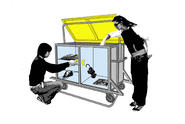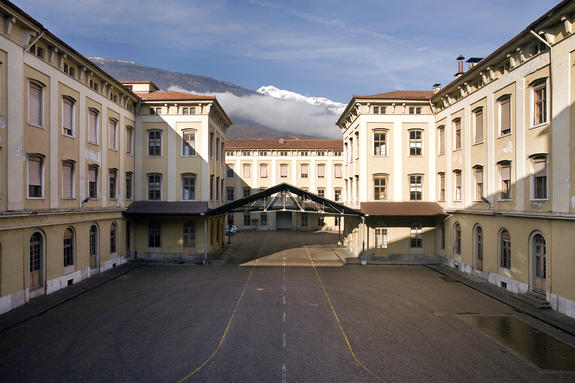
- Activate, Actuate:
- Adam Leech
- Adriana Cavarero
- Adrien Tirtiaux
- Alexander Vaindorf
- ALTERAZIONI VIDEO
- Althea Thauberger
- Anawana Haloba in collaboration with Francesca Grilli
- Anders Kreuger
- Andreas Duscha
- Andreas Müller with David Bennewith
- Andree Korpys and Markus Löffler
- Angela Melitopoulos
- Anna Faroqhi
- Anna Witt
- Anne-Mie Van Kerckhoven
- Ant Hampton
- Arundhati Roy
- Attila Bruni
- Auditory Epode
- Azra Aksamija
- Barbara Visser
- Barbora Klimova
- Bernadette Corporation
- Bernd Ribbeck
- Beth Campbell
- Brave New Alps
- BURGHARD
- Büro für kognitiven urbanismus/Office for cognitive urbanism
- CandidaTV
- Charles Lim Li Yong
- Christian Mayer
- Christian Philipp Müller
- Christoph Ruckhäberle
- Claire Fontaine
- contemporary culture indexBased in San Francisco, US
- Danh Vo
- Daniel Knorr
- Daria Martin
- Darius Ziura
- David Adjaye
- Dayanita Singh
- Deborah Ligorio
- Didier Fiuza Faustino
- Emre Hüner
- etoy.CORPORATION
- Eveli¯na Deicˇmane
- Ewa Partum
- Eyal Sivan
- Eyal Weizman
- Famed
- Francesco Gennari
- Gianluca and Massimiliano De Serio
- Gianni Pettena
- Glen Neath
- Graham Harwood
- Graham Harwood, Richard Wright and Matsuko Yokokoji
- Guido van der Werve
- Hannes Hoelzl
- Hansa Thapliyal
- Harold de Bree
- Heide Hinrichs
- Heidrun Holzfeind
- Hélène Binet
- Hiwa K.
- I. Helen Jilavu
- Igor Eškinja
- Ivana Franke
- Jaime Pitarch
- Janek Simon
- Javier Tellez
- Joachim Koester
- João Maria Gusmão + Pedro Paiva
- Johannes Vogl
- Jorge Otero-Pailos
- Jörgen Svensson
- Jos De Gruyter and Harald Thys
- Josef Strau
- Judi Werthein
- Kamen Stoyanov
- Karl Holmqvist
- KateRˇina Šedá
- Keren Cytter
- Klaus Weber
- Knut Åsdam
- Kristina Bræin
- Latifa Echakhch
- Lawrence Liang
- Libia Castro & Ólafur Ólafsson
- Luca Trevisani
- Luigi Ontani
- m-city
- manifeSTATION
- Marcos Chaves
- Marcus Coates
- Margareth Obexer
- Margrét H. Blöndal
- Martin Pichlmair
- Martino Gamper
- MATTER OF FACT
- Matthew Fuller
- Mazzoni’s Trento Palace: To the Return of Color
- Meg Stuart
- Melati Suryodarmo
- Michał Budny
- Michelangelo Antonioni
- Miklós Erhardt and Little Warsaw
- Miks Mitrevics
- Mladen Dolar
- Mobile Academy, Hannah Hurtzig, Chris Kondek, in collaboration with Karin Harrasser
- Nader Ahriman
- Natascha Sadr Haghighian
- Neil Cummings & Marysia Lewandowska
- Nico Vascellari
- Nikolaus Hirsch & Michel Müller
- Nina Canell
- Omer Fast
- Oskar Dawicki
- Pamela Rosenkranz
- Peter Coffin
- Peter Friedl
- Philippe Rahm
- Philippe Rahm
- Pietro Roccasalva
- Piratbyrån (The Bureau of Piracy)
- Professor Bad Trip (Gianluca Lerici)
- Rä di Martino
- Rabih Mroué
- RADIO PAPESSE
- Ragnar Kjartansson
- Ranu Ghosh
- Reinhard Kropf & Siv Helene Stangeland
- Renée Green
- Ria Pacquée
- Ricardo Jacinto
- Riccardo Previdi
- Roee Rosen
- Rosalind Nashashibi
- Runa Islam
- Rupali Gupte & Prasad Shetty
- Saadi Yousef
- Sanjay Kak
- Saskia Sassen
- Shahid Amin
- Social Art Praxis
- Sonia Leimer
- Stefano Bernardi
- Stephen Willats
- TABULA RASA
- Tamy Ben-Tor
- Tatiana Trouvé
- Teresa Margolles
- TEUFELSgroup
- The Museum for Franco Basaglia
- The Museum of European Normality
- the Museum of Learning Things
- The Museum of projective personality Testing
- the Museum of the Stealing of Souls
- Thomas Meinecke
- Tim Etchells
- Timo Kahlen
- Tom Holert with Claudia Honecker
- Uqbar Foundation
- Valérie Mréjen
- Walter Niedermayr
- Xisco Mensua
- Yane Calovski
- Zilvinas Kempinas
- ZimmerFrei
- __fabrics interseason

artists
Runa Islam
1970 Dhaka, BD Lives in London, UK
THE HOUSE BELONGS TO THOSE WHO INHABIT IT, 2008 16 mm film wITH CD WILDTRACK, 6’52”
ROVERETO

Runa Islam’s work is concerned with disrupting the conventions of cinematic language and building up new ways to read or envision narratives and situations. Islam’s new work for Manifesta 7 continues her recent experiments with the process of “writing with the camera.” The artist has taken inspiration from a graffiti text found on the wall of the building of former Peterlini: “La casa è di chi la abita” (The House Belongs to Those Who Inhabit It). The slogan is an echo of recent anarchists’ interventions, questioning the attitude of local politics towards the heritage of post-industrial architecture. In the film, the camera’s movement is engaged in “spelling out” both the text and image. What is distinct in this version is Islam’s intention to release the camera from the motion-control apparatus previously engaged and to make more gestures. This can be compared to the ‘printed’ word against this ‘hand written’ text. As such, the film bears an almost corporeal, tactile quality. The viewer is impressed by the directness of the gestures but simultaneously distanced from its conceptual, though poetic, articulation of a radical political message. The House Belongs to Those Who Inhabit It is an authentic portrait of belonging. Islam pays tribute to local alternative political movements, focused on the sovereignty of spaces and their proper use.
Location
ROVERETO
ADAM BUDAK: "PRINCIPLE HOPE"
EX PETERLINI, VIA SAVIOLI 20 – MANIFATTURA TABACCHI, P.ZZA MANIFATTURA 1 -STAZIONE FERROVIARIA, PIAZZALE ORSI, I-38068 ROVERETO, ITALY
more